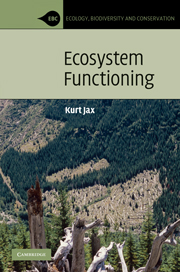5 - Ecosystem functioning
Science meets society
Published online by Cambridge University Press: 05 August 2012
Summary
Dealing with ‘ecosystem functioning’ is not just a matter of science; its meaning and assessment are also dependent on societal choices. This is one of the basic theses of this book. In this chapter, I will take a closer look at what it can mean that ecosystem functioning is (also) a matter of societal choice. For this purpose, I will first (Section 5.1) investigate a possible conclusion that one might draw from the previous chapter – namely that ecosystems are mere (social) constructs – and the implications that would be connected with such a conclusion. By means of a case study about so-called alternative stable states of ecosystems, I will demonstrate that ecosystems and their functioning are at least not mere constructs, but are situated between scientific descriptions and societal choices. As societal choices are always connected with values, I will then discuss how (and which) kinds of values enter into the process of defining and assessing ecosystem functioning (Section 5.2). In another case study (Section 5.3) I will describe how societal choices are part of ecosystem management strategies, analysing especially the so-called Ecosystem Approach (EA) of the Convention on Biological Diversity (CBD). Section 5.4 will then present some general conclusions on the roles of science and society in assessing ecosystem functioning.
- Type
- Chapter
- Information
- Ecosystem Functioning , pp. 113 - 149Publisher: Cambridge University PressPrint publication year: 2010
- 2
- Cited by



